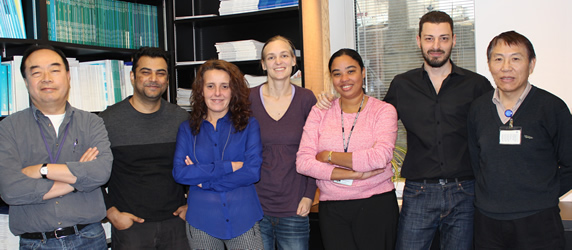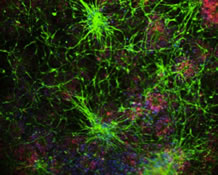
Richard Mayeux, MD, MSc
The Laboratory for Genetic Epidemiology at Columbia University has been studying Alzheimer's disease (AD) across different ethnic populations for nearly 20 years. Led by Richard Mayeux, the lab continues to play a leadership role in the National Institute on Aging Genetics Initiative. The NIA Family Study of Alzheimer's Disease, which includes approximately 1,500 families multiply affected by late-onset Alzheimer's disease (LOAD), is one of the most sought after cohorts for genetic studies in the world. In addition, Mayeux and his team direct the scientific community's largest family study of Caribbean Hispanics, which includes over 700 multiplex families affected by AD. They are also actively engaged in a multi-national effort, which previously identified genetic variants in the SORL1 as a putative genetic risk factor for Alzheimer's disease. In addition, as a senior investigator in the Alzheimer's Disease Genetics Consortium project, Dr. Mayeux and team continue to use genome-wide association (GWA) methods to identify AD genes and have begun whole exome sequencing and targeted sequencing studies. Presently, the lab is focused on investigations of the both risk and protective variants for early-onset and late-onset AD. In addition, they conduct studies of environmental and medical risk factors, the genotypic variability of apolipoprotein-E risk among different ethnic groups, and the relationship between alterations in lipid metabolism and risk of dementia. Members of the Laboratory for Genetic Epidemiology include:

From left to right: Joe Lee, Badri Vardarajan, Sandra Barral-Rodriguez, Christiane Reitz, Dolly Reyes, Giuseppe Tosto, Rong Cheng.
Epidemiologist Joe Lee focuses on unique human cohorts to identify genetic risk factors underlying dementia. He is currently investigating multiplex families with early onset AD to identify genetic modifiers that might explain why some family members carrying the p.G206A variant in PSEN1 have AD at a relatively young age while others remain unaffected at much older ages. By integrating whole exome/genome sequencing with genome wide linkage analysis, he and his colleagues are working to identify and characterize variants that may modulate clinical outcomes. Once candidate genes are identified, he collaborates with Taub scientists, including Carol Troy, Asa Abeliovich, and Lorraine Clark, to further explore the functional role of these genes.
As a statistical geneticist, Rong Cheng analyzes a large number of family datasets as well as unrelated case-control datasets to identify genetic variants that contribute to Alzheimer disease and other aging traits. He performs a wide range of genetic analyses, including genome wide linkage analysis, genome wide association analysis, eQTL analysis, sequence analysis, and gene expression analysis. Presently, he is devoting much of his efforts to both late and early late onset familial Alzheimer disease in Caribbean Hispanics and Long Life Family Study. He also conducts simulation experiments to understand statistical properties of various analytical models and study design.

Gene network predicted by bioinformatics analyses.
Christiane Reitz is a neurologist and genetic epidemiologist. Her recent work includes large-scale GWAS analyses of Alzheimer's disease susceptibility loci in African Americans and Caribbean Hispanics, the development of genetic risk scores to predict AD risk in the general population and identify persons at risk, and the analysis of sequencing data to identify rare and structural variants associated with AD. Dr. Reitz is also an analysis team member of the Alzheimer's Disease Sequencing Project, a major national initiative designed to identify rare sequencing variants increasing risk of AD.
Statistical Analyst Sandra Barral-Rodriguez is currently investigating the role of genetic variants underlying the cognitive changes we see in age-related memory deficits in different elderly cohorts. Using various statistical genetic approaches, she aims to identify genetic variants that can explain why some individuals demonstrate better cognitive performance in late life, while others do not. Her continued collaboration with Dr. Scott Small and other Taub investigators is crucial to the functional characterization of these putative genetic variants.
Postdoctoral research scientist Badri Vardarajan uses computational biology and bioinformatics to analyze and prioritize putative disease causing mutations in whole exome sequencing data. His current project aims to find causal coding mutations that confer risk of Alzheimer's disease in large, multiplex Caribbean Hispanic families with high incidence of dementia and AD.
Neurologist and postdoctoral research scientist Giuseppe Tosto uses various genetic epidemiological and functional genomic approaches to identify sub-phenotypes and/or endophenotypes underlying AD with additional features, such as extrapyramidal signs and hallucinations.
All local, national, and international genetic research studies conducted in the Laboratory for Genetic Epidemiology are made possible by the extraordinary coordination efforts of Dolly Reyes, research staff associate.




